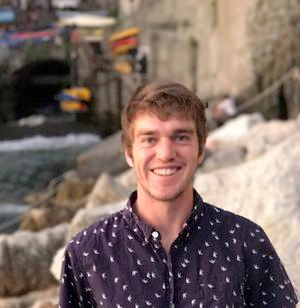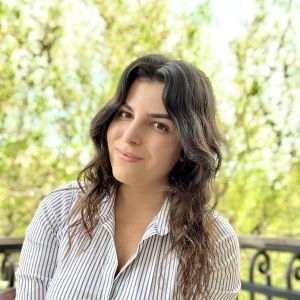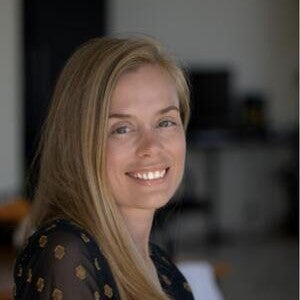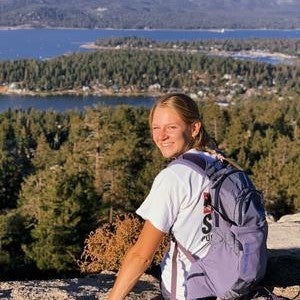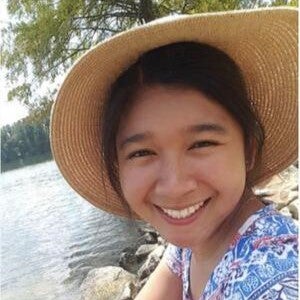Sergey Nuzhdin
My main motivation is to be psyched about science and to have fun doing research. I like to brainstorm with people in the lab and our collaborators for new topics, ideas, systems, and approaches. It might be about fly behavior, planaria population genetics, mustard adaptation, legume agriculture, or even macroalgae and shellfish aquaculture; as long as it is conceptual, innovative, and fun. Understanding how metabolic reactions, cell signaling, and developmental pathways translate an organism’s genome into its phenotype is a grand challenge in biology. Genome wide association studies (GWAS) statistically connect genotypes to phenotypes, whereas a molecular biology approach directly ties gene function to phenotype through gene regulatory networks (GRNs). Using natural variation in allele-specific expression, GWAS and GRN approaches can be merged into a single framework via Structural Equation Modeling (SEM-GRN). This approach leverages the myriad of polymorphisms in natural populations to elucidate and quantitate the molecular pathways that underlie phenotypic variation. This framework can be used to evaluate GRN consistency across genotypes, environments or sexes, to identify the differences in GRNs between species, and to annotate GRNs de novo in non-model organisms.

Postdoctoral Researchers
Gary Molano
Gary Molano is a postdoc working on the giant kelp domestication project. Gary has investigated the population genetics of several Southern California kelp populations, while also characterizing the genetic variation of the giant kelp germplasm currently used in the domestication project. Gary has also worked on the giant kelp genome nuclear and organelle genome assemblies. Gary’s previous work in plants involves using sequencing data to characterize a panel of wild cicer, specifically focusing on the variation present in organelles.
Publications
Molano, G., Diesel, J., Montecinos, G. J., Alberto, F. & Nuzhdin, S. V. (2022). Sporophyte Stage Genes Exhibit Stronger Selection Than Gametophyte Stage Genes in Haplodiplontic Giant Kelp. Front. Mar. Sci. 8:774076. doi: 10.3389/fmars.2021.774076
Gonzalez, S. T., Alberto, F., & Molano, G. (2023). Whole-genome sequencing distinguishes the two most common giant kelp ecomorphs. Evolution; international journal of organic evolution, 77(6), pp. 1354–1369. doi: 10.1093/evolut/qpad045
Kelly DeWeese
Kelly DeWeese works on the Kelp Project using genomics and transcriptomics data from giant kelp (Macrocystis pyrifera) and sugar kelp (Saccharina latissima) to investigate genetic variation that is of potential significance to kelp aquaculture.
Publications
DeWeese, K. et al. (2025) “Scaffolded and annotated nuclear and organelle genomes of the North American brown alga Saccharina latissima,” Frontiers in Genetics, 16. doi: 10.3389/fgene.2025.1494480
DeWeese, K.J. and Osborne, M.G. (2021) “Understanding the metabolome and metagenome as extended phenotypes: The next frontier in macroalgae domestication and improvement,” Journal of the World Aquaculture Society, 52(5), pp. 1009–1030. doi: 10.1111/jwas.12782
Graduate Students
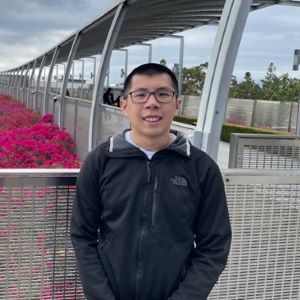
Brandon Vong
Brandon Vong is a Ph.D. candidate in the Molecular and Computational Biology program at USC. He earned his B.S. in Molecular, Cell and Developmental Biology with a Minor in Biomedical Research from the University of California, Los Angeles. He is involved in the kelp team and is interested in studying kelp gene function and development. His research is focused on developing efficient and cost effective methods for kelp restoration and selective breeding.
Maxim Kovalev
Maxim Kovalev is a Ph.D. candidate in the Physical Biology program. He received his M.S. in Bioinformatics from Peter the Great St. Petersburg Polytechnic University, Russia. His main interest lies in the development and application of computational methods in different fields of biology, namely molecular biology and genetics.
Bernadeth Tolentino
Bernadeth Tolentino is a Ph.D. student in the Marine and Environmental Biology program. She is studying the microbiome of kelp toward biofuel and fertilizer applications.
Karina Arzuyan
Karina Arzuyan is a Ph.D. student in the MCB program. She received her B.S. in Marine Biology from UCSD/SIO and her M.S. in Ecology at San Diego State University while studying anthropogenic impacts on seaweed communities. During her Fulbright in Armenia, she studied genomic biodiversity within the phytoplankton communities of freshwater systems. For her research, she is interested in linking blue economy initiatives with the world of algae through the use of genomics.

Jaycee Lanza
Jaycee Lanza is a Ph.D. student in the Marine and Environmental Biology program. She earned her B.S in Marine Biology from UCLA, and her M.S. in marine science from Moss Landing Marine Labs studying reproductive competition in kelp species. She is interested in further investigating reproduction in kelp using molecular techniques.
Kyle Allen
Kyle Allen is currently a PhD student in the Molecular and Computational Biology Program. He obtained his B.S. in Biological Science from University of California, Irvine. He is currently involved in investigating genetic variance within populations of algal species, as well as interested in application of utilizing computation in molecular biology and genetics.
Leah Ferger
Leah Ferger is a Ph.D. student in the Molecular and Computational Biology program. She earned her B.S. in Biology from SUNY Fredonia and an M.P.S. in Marine Conservation from the University of Miami Rosenstiel School of Marine & Atmospheric Science. Her research focuses on the genetic and physiological processes underlying metal sequestration and stress tolerance in Macrocystis pyrifera, as well as phytohormone signaling pathways across kelp species.

Andrea Jackman
Andrea Jackman is a Ph.D. student in the Molecular and Computational Biology program. She received her B.Sc. in biology with a minor in data science from the University of British Columbia. She is studying the role of the kelp microbiome in host health and survival.
Recent Graduates
Luke Genutis
Luke Genutis received his Ph.D. in Molecular Biology program in 2025. He studied genomic analysis using next generation sequencing data and computational tools. His graduate research contributed to projects in Oil Palm and in Drosophila hybrid model systems.
Rachel (Zhihan) Hua
Rachel Hua received her Ph.D. in Molecular Biology in 2025. She received her B.S. in Biochemistry from the University of California, Los Angeles. During her Ph.D. studies she worked on the Mussel Project, specifically focusing on analyzing SNPs.
Publications
Hua, Z., Churches, N. and Nuzhdin, S.V. (2023) “Balancing selection and candidate loci for survival and growth during larval development in the Mediterranean mussel, Mytilus galloprovincialis,” G3: Genes, Genomes, Genetics. 13(7). doi: 10.1093/g3journal/jkad103
Madelyn Harden
Madelyn Harden received her Ph.D. in Molecular Biology in 2024. Her research focused on the genetic diversity, variation, and evolution of California macroalgae. With her work she hopes to apply population and evolutionary genetics to answer a suite of marine conservation biology questions as well as to inform policy initiatives governing coastal ecosystems.
Publications
Harden, M. et al. (2024) “Heat stress analysis suggests a genetic basis for tolerance in Macrocystis pyrifera across developmental stages,” Communications Biology, 7(1), p. 1147. doi: 10.1038/s42003-024-06800-7
Jordan Chancellor
Jordan Chancellor received her Ph.D. from the Marine Biology and Biological Oceanography program in 2024, co-advised by Dr. Nuzhdin and Dr. Gracey. She received her B.S. in Ecology and Evolutionary Biology at Yale University. Her research interests focus on sustainability and global food security, specifically the role that bivalves can play in mitigating the use of terrestrial protein sources. She is interested in understanding the quantitative traits underlying disease resistance in bivalves that can be applied to large-scale selective breeding.
Inessa Chandra
Inessa Chandra received her Ph.D. from the Marine and Environmental Biology program in 2024. She studies the temporal dynamics of giant kelp physiology, primarily using transcriptomics and in the context of the circadian clock and senescence. She hopes her work will contribute to advances in aquaculture (breeding “stay-green” traits), restoration (understanding local adaptations), and macroalgal carbon accounting (intrinsic controls for balance and timing of carbon flux).
José Diesel
José Diesel received his Ph.D. in Molecular Biology in 2023. His work during his graduate and post-graduate studies revolved around studying the genetics of giant kelp to improve farming practices and enhance its sustainability. Through bioinformatics tools, José assembled the genome of giant kelp, allowing him to explore its evolution and population genetics. His research also explored the resilience and adaptability of this important species by investigating the distribution and impact of mutations. José’s ultimate goal is to leverage this knowledge to optimize kelp farming and contribute to the preservation of our marine ecosystems.
Publications
Diesel, J.F., Molano, G. and Nuzhdin, S.V. (2025) “The mutation atlas of giant kelp (Macrocystis pyrifera): a mutation database resource for natural knockouts,” Frontiers in Plant Science, 15. doi: 10.3389/fpls.2024.1338572
Diesel, J. et al. (2023) “A scaffolded and annotated reference genome of giant kelp (Macrocystis pyrifera),” BMC Genomics, 24(1). doi: 10.1186/s12864-023-09658-x
Melisa Osborne
Melisa Osborne received her Ph.D. in Molecular Biology in 2023. Her doctoral and postdoctoral work focused on characterizing the associated microbial community of giant kelp, and applications to aquaculture of kelp for biofuels.
Publications
Osborne, M.G. et al. (2024) “Investigating the relationship between microbial network features of giant kelp ‘seedbank’ cultures and subsequent farm performance,” PLOS ONE. 19(3). doi: 10.1371/journal.pone.0295740
Osborne, M.G. et al. (2023) “Natural variation of Macrocystis pyrifera gametophyte germplasm culture microbiomes and applications for improving yield in offshore farms,” Journal of Phycology, 59(2), pp. 402–417. doi: 10.1111/jpy.13320
Website by Marcus Lin
Contact Us
USC Laboratory (MBIO)
Ray R. Irani Hall Room 316
1050 Childs Way
Los Angeles CA 90089
USC Aquaculture Facility (AltaSea)
AltaSea at the Port of Los Angeles
2451 Signal Street Berth 59
San Pedro, CA 90731
